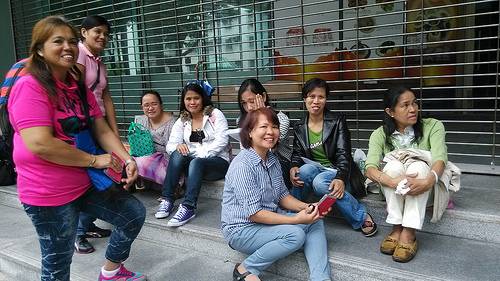
Image by Lennon Ying-Dah Wong and issued under the following licence
"Mobile Identities. Migration and Integration in Transnational Communities" is a transnational project financed by the European Commission, DG Home, European Integration Fund that aims at evaluating the impact of existing policies on integration in fostering the well-being of migrants involved in temporary or circular migration or in different Kinds of transnationalism.
The project intends to explore the existing links between the different kinds of circular/temporary migration and integration processes in European countries. Most European integration policies are in fact rooted on the idea of a long-term permanence of migrants. The logic behind these policies is to consider origin and destination countries as two alternative poles of the migration path. In recent years, many European Governments have regarded circular migration as one possible solution to the challenges posed by the integration of immigrants. In particular, circular migration seemed to provide the opportunity of a "Win-Win-Win approach", i.e., favoring all interested parties: origin and destination countries as well as migrants and their families.
The project is Co-funded by the European Union, with the financial support of Directorate B-Immigration and Asylum-Directorate-General Home Affairs, and European Commission, European Fund for the Integration of third-country nationals 2007-2013.
The overall aim of the project is to evaluate the impact of existing policies on integration in fostering well-being of migrants involved in temporary or circular migration or in different kinds of transnationalism. The project seeks to understand:
- The profiles and needs of transnational migrants in European countries;
- If and how current integration processes in European countries match the needs of transnational migrants; and
- What can be done both in EU and non-EU countries to foster the well-being of transnational migrants.
The attainment of these objectives will permit the development of country specific and EU guidelines for integration measures in receiving countries that work in synergy with pre-measures and conditions in sending countries.
In the medium term the project is expected to lead to improvements in temporary/circular migrants integration and participation in society both in the country of origin and arrival countries while also promoting migrants' well-being. The long-term impact (achieved through the consolidation of connections between integration and transnational mobility) is expected to enable:
- Immigrants to experience, and perhaps share with the host community, new models of post-national belonging that take into consideration the country of origin, arrival country and future destinations - which may be another EU country - as one "integrated" space; and
- Arrival countries to improve the governance of this type of transnational movements not only respect the seasonal and temporary demand for labour, but also migrants' well-being.
Psychoanalytic Institute for Social Research (IPRS)
(Coordinator)
Rome, Italy
r.bracalenti@iprs.it
iprs@iprs.it
Christiches Jugenddorfweek Deutschlands (CDJ)
Hamburg, Germany
a.wiesner@cjd-eutin.de
Autonomous University of Barcelona
Barcelona, Spain
Zyab.ibanez@eui.eu
University College London
London, United Kingdom
s.Kuechler@ucl.ac.uk
Free University of Amsterdam
Amsterdam, The Netherlands
p.nijkamp@vu.nl
Univerzita Mateja Bela Bratislava,Slovakia
Alexandra.bitusikova@umb.sk
Associate partners
Municipality of Reggio Emilia, Italy
Association of foreign Workers (ASLI), Italy
North-German Union of Islamic Communities, Germany
Marie Curie University, Poland
Mohamed First University, Morocco
Organization for Development and Emancipation,Albania
Workshop
The UK National Workshop was held on 25th March 2015 at the Department of Anthropology, UCL.
Publications
The following presentations are being prepared for publication.
- Presentation: Oxford Migration Studies Society: forthcoming on the 15-16 May:
Migration on the Margins: Exploring constructions of the "illegitimate
migrant", paper title: Invisible Workers- migrant domestic workers
in the UK (PDF)
- Paper presented by Dr Tomoko Hayakawa on 24th February 2015, the London Migration Research Group. "The Paradox of temporary migration".
- Paper presented by Prof Sandra Wallman to Socal Anthropology Seminar, University of Stockholm, 29 September 2014. "Reflections on Temporariness".
Other Dissemination
- Podcast interview 30th January 2015 by the Global Lab: the UCL Centre for Advanced Spatial Analysis (UCL-CASA): http://soundcloud.com/the-global-lab/the-global-lab-crossing-borders
 Close
Close



